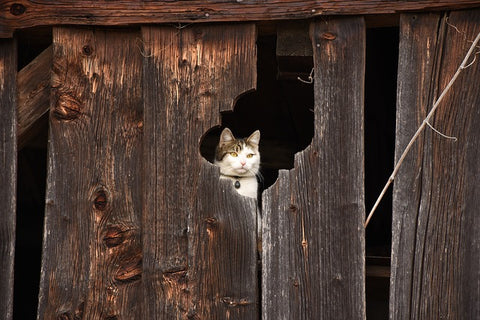
Losing a pet is one of the most gut-wrenching experiences we can face as pet owners. Not knowing whether our dog is running down a street, in danger of being hit by a car, or whether our cat has gotten stuck somewhere and is hungry and afraid.
Our first step should be to prevent our pets from running away or getting out of our property in the first place. The next step--if your pet has already gotten loose--may include a good deal of work and diligence to ensure that your pet returns home safely.
Preventing a pet from becoming lost
Pets often run away when they are first brought home from a shelter or pet store because they don’t realize it’s their new home or they don’t feel safe yet. In the same way, pets might run away after a move because of their new unfamiliar surroundings or the hustle and bustle that comes with moving. It’s important to keep indoor-outdoor cats inside for at least three weeks before being let out so they get to know their new home as a safe haven where a kind owner gives them food and pets every day.

Other reasons why pets run away include being frightened by something at the home, loneliness, boredom, seeing something they want to chase, or looking for a mate (always spay and neuter your pets!).
Your dog should always have on a collar with tags, as should cats that go outdoors, and all cats and dogs should absolutely be microchipped. Even if you ensure that your pet always has on a collar with tags, it’s possible for your pet to get its collar snagged on something and lose it, and unfortunately, it’s possible that someone could remove the collar and try to keep or sell your pet.
Don’t let your dog off its leash in areas that aren’t fully enclosed. Even if you think your dog will stay close and knows better than to run off, you never know what your dog could see or experience that could cause it to jet or run into the road. Additionally, you should consistently check the perimeters of your property to make sure that your yard is secure.
Have a cat that isn’t happy unless it can go outside? Build a cat patio! They might be expensive to purchase, but they’re not pricey to make yourself. Here are some easy-to-make designs, and you could always enlist the help of a friend!

What to do if your pet goes missing
A lost dog is almost always easier to find than a cat. Chances are your dog is running around the neighborhood and streets, which is highly dangerous. Dogs often become frightened or overly-excited when they run away from home and will run into the road or venture further away from home, causing a dog that usually knows its way home to become lost. Doing everything you can to find your pet the first day is vital to your success.
Follow these steps to find your lost pet:
-
Help from your neighborhood: Many neighborhoods use Nextdoor.com or a similar app, website, or Facebook to help neighbors connect with each other. Quickly create an account (if you don’t already have one) and check to see if anyone has posted about your pet. If no one has, make a post about your pet that includes the area you live, a picture of your pet, your contact information, and any other important details.
-
Walk, bike, or drive through your neighborhood, stopping to ask people if they’ve seen your pet. If you don’t have any luck, go back out and look every couple of hours. Print out maps of your neighborhood and mark off the streets that you’ve checked each time you go out. When you find your pet, don’t drive right up to it. Park down the road and walk.
- For dogs, the longer yours has been missing, the further out you should search, being sure to frequently check the areas your pup is most familiar with.
- Cats are more likely to stay close to your home and hide, so it’s best to walk around on foot with a bag of treats or food.
-
Pack your pet’s favorite treats and toys, especially if your pet is skittish. Bring canned wet food for your cat--you know how cats love the sound of a can of wet food being opened! If you have another dog that your lost dog gets along with, bring it along to help.
-
Make a poster! Print off a bunch and slide them into plastic sheet covers to protect them from the rain or snow. Here’s a great template by Animal Healings. Just download it, plug in your information, and you’re good to go!
- Contact your local shelters and rescues
- Try looking online if you haven’t been able to find your pet after a day or two. You might find your pet posted on Craigslist, Pet Finder, Fido Finder, or the Humane Society’s Center for Lost Pets.
If some time has passed and you still haven’t been able to find your pet, don’t give up. Most pet owners find their pet at some point! The more active you are in looking for your pet, the higher your chances of finding it will be. Hopefully, your kitty or pup will soon be happy in your home again.


